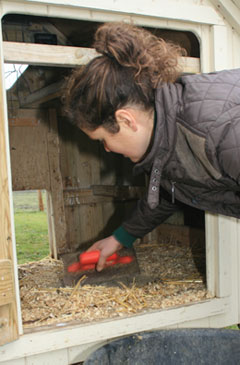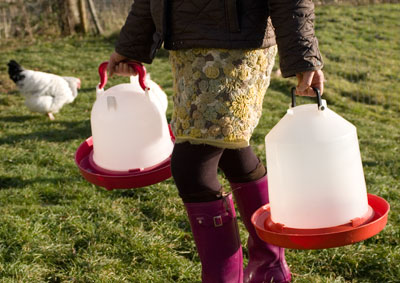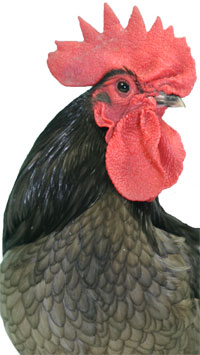Stress is a major contributor to ill health in chickens and can also make them more prone to a number of vices such as feather picking, egg eating, comb or vent pecking.
Chickens kept in intensive conditions are constantly subjected to stress which is why farmers see such high mortality rates and have to pay out to keep birds healthy and make them productive. Fortunately, keeping chickens in our back garden isn’t exactly intensive as long as they have a sufficiently large run or are let out of their run regularly to free-range although there are pleanty of other times when chickens can suffer from stress.
In short, stress is best avoided whenever possible and a little bit of care and forethought can dramatically reduce stress in your birds.
So how do we know what stresses chickens? Well, some years ago, there were studies done that measured the stress hormone ‘corticosterone’ of birds in different situations and it is this research that has enabled us to understand the stressors.
Stressors.
As well as intensive conditions causing stress, the other main stressors can seem quite trivial to us.
- Handling. This is one of the biggest stressors. Chickens are a prey species so naturally, if caught and picked up, they become stressed. Whilst regular handling is important for health checks, chasing a bird around a run for 5 minutes every time will not help. Try to catch birds in a confined area such as a house quickly and calmly. Hold the wings firmly and then transfer the bird to the holding position with your right hand underneath her, breast in the palm of your hand, fingers holding the tops of the legs. Her head should be underneath your arm so her head is looking behind you. Use your left hand to examine her.
- Introducing new chickens. Chickens are flock animals that have a pecking order. It is thought the ancestors to our chickens, the Red Jungle Fowl of South East Asia use the pecking order to assist in their survival. If every bird has her place, when it comes to feeding time, each one can have her turn and they don’t have to spend precious time arguing which may alert predators to their where-abouts. Every hen knows her place in the pecking order and by introducing new birds, the pecking order is upset. No hen knows where she stands and this will cause arguments and considerable stress for days until they have sorted themselves out into a ‘new flock’.
- Lack of food or water. This stress is completely avoidable of course but we all have those one off days when we suddenly realise that our birds have run out of water for one reason or another. A leaky water container, frozen water or just a forgetful moment!
- Extreme heat. Chickens don’t sweat. To cool down, a chicken must either take on cool water (and excrete more to lose the excess fluids and some heat) or pant which removes heat through the air they exhale. Chickens are much better equipped to deal with the cold and can keep their body temperature up by eating more and trapping air inside their feathers to insulate themselves thermally. Heat will cause chickens to become stressed.
- A new environment. This can be taking a bird to a show, getting your birds for the first time or just moving them to a different house or run. Another environmental change that is hard to avoid but causes considerable stress for your birds is when there has been a covering of snow.
- Egg laying. This is surprising since this is a natural things that chickens do but egg laying does cause stress on your hens. Giving them a peaceful, private, darkened nest box can help. Try not to disturb hens that are in the process of laying.
- Predation. Foxes or other predators visiting the garden on a regular basis are likely to cause stress. In the extreme case, after a fox attack, even though a chicken may survive the wounds inflicted by a fox (he grabs a mouth full of her feathers for example and the chicken escapes), she can still die because of the stress.

If you can minimise stress, your birds will be less prone to picking up disease which is something we would all like: happy, healthy chickens!






Hi
I have 6 chickens (?bovan goldlines/egg farm cast offs). Up until about 6 weeks ago they had free range of the garden but we’ve penned them in as they were making it difficult to use the garden (poo and destruction!). Egg production has dropped off. Quite a few of them are looking quite naked arounds their back end and under their wings. They are not happy to be penned in but they are getting plenty of greens and we let them out when we can keep an eye on them. Initially we had them on a piece of newly cleared ground – it had previously had an old shed on it. We wondered whether being on there had affected them as the shed was made with timber soaked in tar. Am I worrying needlessly or have we unwittingly poisoned our poor ladies?
It is unlikely, they don’t usually eat anything they shouldn’t eat. It sounds as if they have either gone into a partial moult, or are feather picking, or have lice that are causing them to over-preen.
Ah my poor chickens – I’d love any help/ advise! Two weeks ago we began our backyard chicken adventure and brought 8 hens of varying ages to be with us. Three of them are mature layers. The first few days everything seemed fine and the layers laid well. Now – two weeks in, I am pretty concerned. We have done just about everything on the list above…. A new flock in a new place… We’ve probably handled too much, kids chasing them around the yard, it’s been very hot, etc etc. They are definitely trying to figure out the pecking order. This evening I removed the two 10 week olds as it literally looked and sounded as if one of the older birds was intent on killing one of them. They have been pecking each other, scratching under their wings and vent areas, etc. Help! Have I ruined these chickens with all the stressors? What can I do to help them de-stress?
If you can divide their run, give each group a chance to settle and sort themselves out whilst being close to the others, that would help. When they have settled, introduce them at night into the same house but make sure they can get out / away at first light. Provide lots of space, multiple feeders and in time, they should sort out the pecking order. It can be horrible to watch but as long as there is no blood drawn (if so, remove at once) leave them alone. If there is one particular bully, this one could be removed, again in an area of the run where they can still see one another but not cause harm.
We got 2 Dutch Partridge Bantam chicks on saturday and they seem to have settled in pretty well;they drink, sleep, eat, chirp, but there has been a bit of blood in their poo. I’m not sure if it’s just one of them or both, or whether it’s due to a bit of stress. I am really worried about them so any ideas or help would be really helpfull.
Thanks 🙂
Blood in the droppings is usually a sign of coccidiosis. Your vet should be able to test a sample.
I bought some 4 month old pullets put them in the back of truck seemed after a couple days they got sick. seems like crd
Hi Keeping chickens,
we have since 3 years Brahma’s and they are great, however the last few weeks one of is losing weight and is pale around the eye’s. She is not eggbound, is not very active like the others, lies down a lot even when it’s not so hot. We have checked her backside and found nothing. She is also not very stabile. What can we do to save her as we lost another one that had simulair behavour. Please advise if possible
Assuming she is wormed, and there are no red mite in the coop that are making her anaemic, take her to your vet. The symptoms are too general to get any other idea…